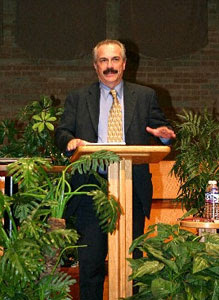Wednesday, January 2, 2008
“Turbo”-Charged Idiocy About Torture

Roughly thirty years ago, the late Johnny Carson unveiled the masterpiece in his collection of sketch-comedy characters: Floyd R. Turbo, the plaid-wearing people’s pundit.
Imagine a genetic experiment that produced a hybrid of Elmer Fudd and George W. Bush (especially the familiar vacant stare) and you’ll get the basic idea of Mr. Turbo’s appearance and general demeanor.
Taking advantage of a local television station’s offer to air guest editorials from the public, Mr. Turbo (who once helpfully explained that his middle initial R stood for “Arthur”) would materialize from time to time to impart his rustic wisdom about current affairs.
Here, for instance, is his take on nuclear energy:
“And what’s all this fuss about plutonium? How can something named after a Disney character be dangerous?… They say atomic radiation can hurt your reproductive organs. My answer is, so can a hockey stick, but we don’t stop building them.”
Carson once explained that Turbo was meant to be “the epitome of the redneck ignoramus,” but the character resembles none of the rednecks I’ve been honored to know. As written and performed, Turbo embodied one of those “Every Town Has ‘Em” personalities – the self-appointed seer whose supply of certitudes greatly outweighs his inventory of facts, and who is given to expressing those certitudes in the most graceless way imaginable.
What Carson and his writing staff created was an uncannily prophetic representation of the variety of punditry that typifies contemporary conservatism: Give old Floyd a decent haircut and an expensive suit and he’s ready to guest-host The O’Reilly Factor or Hannity and Colmes.
Give him the top editorial post at WorldNetDaily and a Creator’s Syndicate column, and Floyd could just as easily fill in for Joseph Farah.
I was prompted to think of Turbo’s dubious sagacityas I read Mr. Farah’s latest homily regarding the moral virtues of torture – or at least of that method of torture called waterboarding, which Farah insists isn’t actually torture.
The fact that “there is a growing chorus of opposition against any further use of waterboarding” is clear evidence to Farah that “Americans are simply losing their ability to distinguish right from wrong…. Up is down, day is night, left is right and right is wrong.”
Yes, our country is in the throes of a moral crisis: Apparently, most Americans still oppose torture.
The use of waterboarding is morally appropriate, Farah insists, because the Bush administration tells us it was used to break “two of al-Qaida’s top operatives – Khalid Skeikh Mohammed … and Abu Zubaida…. In both cases, there is reason to believe planned terrorist attacks were foiled as a result of this technique.”
The only “reason to believe” such a claim is the word of an administration that has not told the truth about any issue of public consequence.
For Farah, waterboarding – better described as controlled drowning – is perhaps the most humane of the “enhanced interrogation techniques” that should be used against terrorist suspects. (Like most commentators of his ilk, Farah simply refers to such detainees as “terrorists,” since he has a Soviet prosecutor’s confidence in the guilt of anyone trapped in the machinery of state detention). But most importantly, torture must be permissible because Jack Bauer approves of it.
“Let’s not tie the hands of future Jack Bauers who will need to do what they have to do to save lives,” pleads Farah.
It would have been helpful for somebody to let Floyd Turbo know that the name given to the element called plutonium had nothing to do with a cartoon dog. And some kind soul really should disabuse Joe Farah of the idea that Jack Bauer is a real person – or, more to the point, that the fictional character called Jack Bauer is in any sense a sound moral role model.
He’s not a real person, Joe.
According to Farah, controlled drowning, although an effective way to break a subject’s will, isn’t torture.
“My definition of torture is simple,” he continues. “It involves physical or mental abuse that leaves lasting scars. Cutting off fingers, toes, limbs – that would be torture. Forcing prisoners to play Russian roulette – that would be torture. Sticking hot pokers in the eyes of prisoners – that would be torture.”
So unless the procedure involves death or mutilation, it isn’t to be considered torture, from Farah’s perspective. Additionally, waterboarding doesn’t make the cut because “the US military waterboards hundreds of our own soldiers every year … [as] part of the conditioning Special Forces troops undergo to prepare for battle and the possibility of capture by the enemy.”
Wait a minute: Against what contingency are Special Forces troops being “conditioned” here? The obvious assumption is that captured US troops might be subjected to waterboarding by an enemy.
If US troops were captured by, say, Iran, and some of them were subjected to waterboarding, I doubt that Farah would have any difficulty considering such an atrocity to be “torture.”
But as an apologist for the Bush Regime’s most heinous innovation – the institutionalization of torture – Farah might find himself caught in the same conundrum that recently trapped Brig. Gen. Thomas Hartmann, chief legal adviser to the Pentagon’s Office of Military Commissions.
A few weeks ago, Sen. Lindsey Graham (R-South Carolina) asked Gen. Hartmann essentially the same question: How would the military’s legal community react if the Iranian government used water torture to extract vital strategic information from a captured US soldier?
“I am not prepared to answer that question,” responded Gen. Hartmann, the kind of reply one offers when it’s too dangerous to speak the obvious truth.
Hartmann’s performance prompted naval Lt. Commander Andrew Williams, a member of the Judge Advocate General corps, to resign his commission in disgust.
“There was a time when I served with pride,” wrote Williams in a letter to his local newspaper in Gig Harbor, Washington. “Sadly, no more.”
“Thank you General Hartmann for finally admitting the United States is now part of a long tradition of torturers going back to the Inquisition,” continued a bitterly disillusioned Williams. “Waterboarding was used by the Nazi Gestapo and the feared Japanese Kempeitai [military police]. In World War II, our grandfathers had the wisdom to convict Japanese Officer Yukio Asano of waterboarding and other torture practices in 1947, giving him 15 years hard labor. Waterboarding was practiced by the Khmer Rouge at the infamous Tuol Sleng prison…. [T]he United States Army court martialed a soldier for the practice in 1968 during the Vietnam conflict.”
It didn’t start in the “War on Terror”: U.S. and allied troops waterboard a captured Viet Cong fighter.
Farah, a veritable Brian Boitano when it comes to skating on the surface of important questions, doesn’t seem to know much about the history of waterboarding, and isn’t inclined to examine the implications of institutionalizing the practice.
Professor Darius Rejali of Reed College, author of the new book Torture and Democracy, points out that waterboarding was widely practiced by US occupation forces in the Philippines in the early 20th Century (something I’ve discussed before). “Returning soldiers brought water torture back to their civilian jobs as policemen in the 1910s, and it soon appeared in military prisons and police stations in large cities and small towns, especially in the American South. By the 1920s, one can find the full encyclopedia of modern water torture already written up in American newspaper accounts and trial transcripts.”
Waterboarding was one of the relatively refined, “clean” forms of torture that thrived in police departments nationwide between 1902 and 1931, observes Rejali. This subculture of official abuse was able to thrive precisely because people were sold on the spurious definition Farah is trying to peddle – that is, only practices that result in dismemberment, disfigurement, or death can be regarded as torture. Because the preferred methods left no marks, the public wasn’t aware of widespread police torture until the American Bar Association published an expose in 1931.
As Rejali points out, where torture is concerned “there’s no real boundary between `there’ and `here.’ It would be ignoring history to assume that what happens in an American-run prison in Iraq qill stay in Iraq. Soldiers who learn torture techniques abroad get jobs as police when they return, and the new developments in torture you read about today could yet be employed in a neighborhood near you.”
“When people can’t speak intelligently about cruelty, they aren’t likely to be able to protect themselves against tyranny at home,” concludes Rejali.
Unfortunately, too many conservatives of Farah/Turbo variety are incapable of such critical thinking about government power when the conversation turns to its most destructive manifestations — such as war and torture.
Dum spiro, pugno!
Content retrieved from: http://freedominourtime.blogspot.com/2008/01/turbo-charged-idiocy-about-torture.html.






























